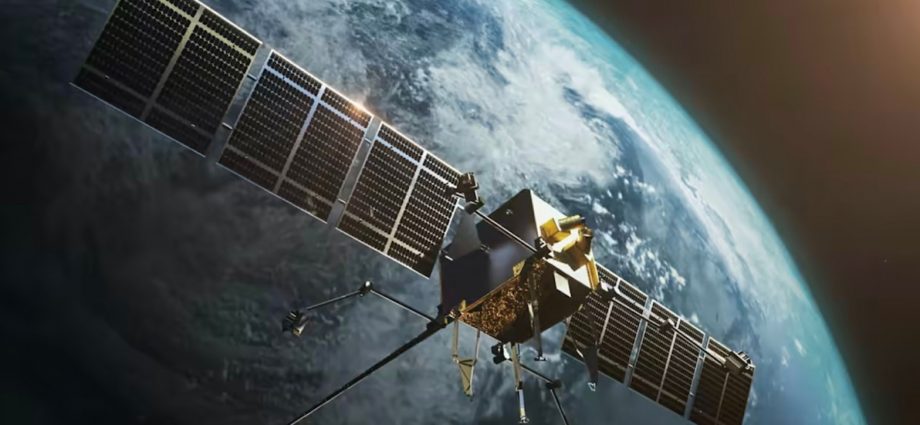TOKYO – Mitsubishi Electric has invested US$25 million in Astroscale, Japan’s leading space debris removal start-up, in a deal that will develop and manufacture satellite buses for Japan’s national security satellite constellations.
The buses will be equipped with a standardized docking plate that other spacecraft can use when servicing, moving or deorbiting satellites that cannot deorbit themselves when they are no longer operational. The goal is to help maintain a safe orbital environment and to promote the design of satellites that are easier to service and remove from orbit.
“We are on a mission to make on-orbit servicing routine by 2030,” says Astroscale founder and CEO Nobu Okada.
Mitsubishi Electric’s investment in Astroscale will accelerate its R&D and technological diversification. Astroscale, on the other hand, gains financial stability, scale and a broader scope of operations at a time Japan’s space program is rapidly advancing.
On February 27, Astroscale announced the close of its Series G round of financing with more than $76 million raised from new investors including Mitsubishi Electric, Yusaku Maezawa, Mitsubishi UFJ Bank, Mitsubishi Corporation, Development Bank of Japan and FEL Corporation, a Tokyo-based investment company.
Yusaku Maezawa invested $23 million. He is the billionaire founder of online shopping company Start Today and the fashion apparel e-commerce website Zozotown. A prominent space tourist, he became the first Japanese citizen to visit the International Space Station in December 2021.
Astroscale has raised a total of $376 million since it was founded in 2012 and now has more than 400 employees. Headquartered in Tokyo, it has subsidiaries in the UK, US, Israel and Singapore, and aims to establish a presence in Australia.
Its potential market is vast. The amount of space debris in low-earth orbit is rapidly increasing, creating serious risks to operational satellites and their users.
“These risks and the wasted value and opportunity inherent in single-use space operations, have driven Astroscale to pioneer on-orbit services such as end-of-life removal of satellites, active debris removal, in-space situational awareness and satellite life extension,” Astroscale’s management says.

Richard DalBello, director of the US Office of Space Commerce, is among those concerned by the rising amount of space junk.
He recently told the National Space Council’s User Advisory Group that “Truthfully, there are no great ideas today on how to solve overall the debris problem that we have with large debris and small debris… if somebody made a major mess in space, we don’t have any way to clean it up.”
Astroscale is working on that and on other space problems.
On February 16, Astroscale UK and consortium partners Raytheon NORSS and SJE Space Ltd announced they had been awarded £100,000 by the UK Ministry of Defense Science and Technology Laboratory to study space-based space domain awareness (SB-SDA) concepts for missions to be launched in the 2030s.
NORSS (Northern Space and Security) is a UK-based specialist in space situational awareness, space domain awareness and space surveillance and tracking. Headquartered in Alnwick, Northumberland, it was founded in 2017 and acquired by US defense contractor Raytheon in 2022. Its 22 team members have more than 100 years of combined experience in orbital analytics, operations, risk management and space policy and law.
SJE Space is a UK consultancy registered in Berkshire that specializes in the assessment of satellites and associated space infrastructure. Its director, Stuart Eves, has worked for more than 30 years on satellite communications, satellite surveillance and space situational awareness for the UK Ministry of Defence and private industry.
The coalition will assess currently available SB-SDA technologies, how they are likely to evolve and how they compare with ground-based SDA.
On November 8, 2022, Astroscale US signed a Cooperative Research and Development Agreement with the US Air Force Research Laboratory aimed at identifying rendezvous, proximity operations and docking needs to improve space domain awareness and logistics, and to develop space servicing, assembly and manufacturing capabilities.
This, says Ron Lopez, president and managing director of Astroscale US, is “a strategic imperative for the United States.” The project should familiarize Astroscale with the operational concepts of the US Space Force in low-earth orbit, geostationary orbit and cislunar space travel.
The removal of space debris is only part of Astroscale’s business. It also has close associations with the space and defense establishments of Japan, the US and the UK. A review and analysis of the company’s origins, management, operating environment and mission can be found here.
Mitsubishi Electric is a large diversified electronics company and defense contractor with particular expertise in electric power systems, industrial automation, satellites and satellite components and gallium nitride high-frequency semiconductor devices used in satellite communications.
It also produces radar equipment, antennas, missiles and fire control systems. It is Japan’s only satellite manufacturer with capabilities running the gamut from development and design to final assembly and test.
With more than 40 years in the business, Mitsubishi Electric has participated in dozens of commercial and government communications, earth observation and other satellite programs in Japan and overseas.

Its DS2000 satellite platform was modeled on the engineering test satellite platform developed by the Japan Aerospace Exploration Agency (JAXA), which incorporates technologies from leading Japanese laboratories such as the National Institute of Information and Communications Technology (NIST) and Nippon Telegraph and Telephone Corporation (NTT).
Mitsubishi Electric is the prime contractor for JAXA’s Engineering Test Satellite 9 (Kiku 9), which is scheduled to be launched this year.
Japan’s satellite industry is still dominated by Mitsubishi Electric and NEC, the nation’s leading telecommunications equipment manufacturer, but start-ups such as Astroscale have proliferated in recent years, developing new technologies at a pace that large companies cannot match.
Follow this writer on Twitter: @ScottFo83517667

